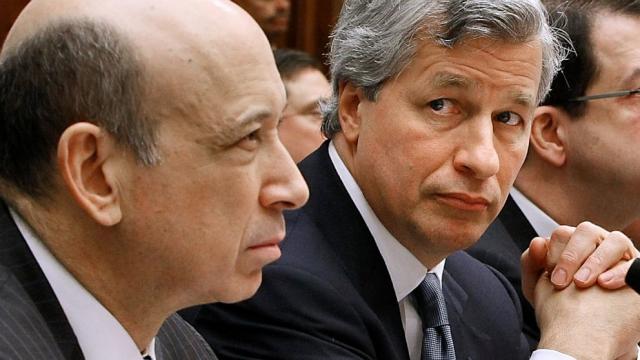
America's largest bank, JP Morgan, is close to finalizing a $13 billion record settlement with the U.S. authorities over a number of issues related to the subprime mortgage crisis.
The settlement, described as tentative in some reports, is even greater than the $11 billion that had been expected and is said not to release the bank from any criminal liability. It would also be the largest ever between the U.S. government and a single company.
The bank's chairman and chief executive Jamie Dimon had been involved personally in the discussions with the U.S. Department of Justice and this month JP Morgan admitted it had incurred legal expenses of $9.2 billion from regulatory investigations and lawsuits.
In total the bank has put aside $23 billion for potential litigation since 2010 – and has warned this could rise by a further $6.8 billion – in moves that illustrate the stunning reversal in fortunes of a bank that had survived the banking crisis relatively unscathed.
JP Morgan now faces more than a dozen investigations globally – from alleged bribery in China to a possible role in manipulating benchmark interest rates set in London known as Libor.
Dimon had steered the bank through the financial crisis without ever reporting a quarterly loss, but that record ended this month when he had to admit that legal expenses drove the firm to a loss of $400 million.
The latest settlement relating to mortgage-backed securities follows a fine of more than $900 million from a number of authorities over last year's London Whale trading incident, which Dimon had originally attempted to brush aside as "tempest in a teapot."
The Whale episode also lost the bank $6.2 billion and Dimon's bonus was halved as a consequence.
At issue in the latest settlement is whether the bank sold mortgages that it knew were riskier than they appeared. Investors, including government-owned mortgage agencies Fannie Mae and Freddie Mac, said that the bank told them loans were safer than they were, or that the bank was negligent in not verifying information from borrowers relating to their income and their ability to repay the debt.
A sizable chunk of the $13 billion relates to customer redress. According to Bloomberg the settlement includes $4bn to the Federal Housing Finance Agency – which incorporates Fannie Mae and Freddie Mac.
Dimon secured the tentative deal in a meeting with the Justice Department's attorney general, Eric Holder, according to CNBC. Steve Cutler, the bank's general counsel, and Tony West, Holder's deputy, were said to be involved.
Dimon and Holder had met face-to-face in Washington last month. A well-connected figure in financial and political circles, Dimon took the helm of JP Morgan in December 2005. He is now running the biggest U.S. bank in terms of assets.
As well as surviving the financial crisis, the banker has also resisted calls to split his joint roles at the bank.
The settlement is partly the result of JP Morgan saving two firms – Bear Stearns and Washington Mutual – which account for about 80% of the securities involved in the $13 billion fine. The U.S. government encouraged JP Morgan to rescue both institutions as they were collapsing during the financial crisis.
This month the bank said Dimon was no longer chairman of JP Morgan's main US retail banking subsidiary.
JP Morgan did not comment, and the U.S. Department of Justice could not be reached.
Ongoing Tempest
For all his smooth talking, it is likely that the most memorable line to emerge from the career of JP Morgan boss Jamie Dimon will be his crack about a "tempest in a teapot". That was his attempt to dismiss reports of problems in the bank's London office, where it turned out that his traders had lost $6 billion.
The comment was perhaps the result of confidence gleaned from years of uninterrupted success, which included being one of the few bankers to emerge from the financial crisis with an enhanced reputation. However, the pressure is now increasing on Dimon as he wrestles with a string of legal complaints.
This was not how it was all meant to be, as Dimon has long appeared to have led a blessed life.
A protege of former Citigroup boss Sandy Weill, who is often described as a "Wall Street legend", he graduated as a Baker scholar from Harvard Business School, an honour given only to the top 5% of the graduating MBA class. His classmates included GE boss Jeff Immelt, and Dimon's future wife, Judy.
3 WAYS TO SHOW YOUR SUPPORT
- Log in to post comments















